Corporation Law: Duties and Liabilities of Directors
VerifiedAdded on 2022/12/30
|11
|3079
|1
AI Summary
This document discusses the fiduciary duties and statutory duties of directors under the Corporations Act 2001. It explains the concept of safe harbor and its limitations. It also analyzes a case study of directors breaching their duties. Finally, it explores the defenses available to directors in case of insolvent trading.
Contribute Materials
Your contribution can guide someone’s learning journey. Share your
documents today.
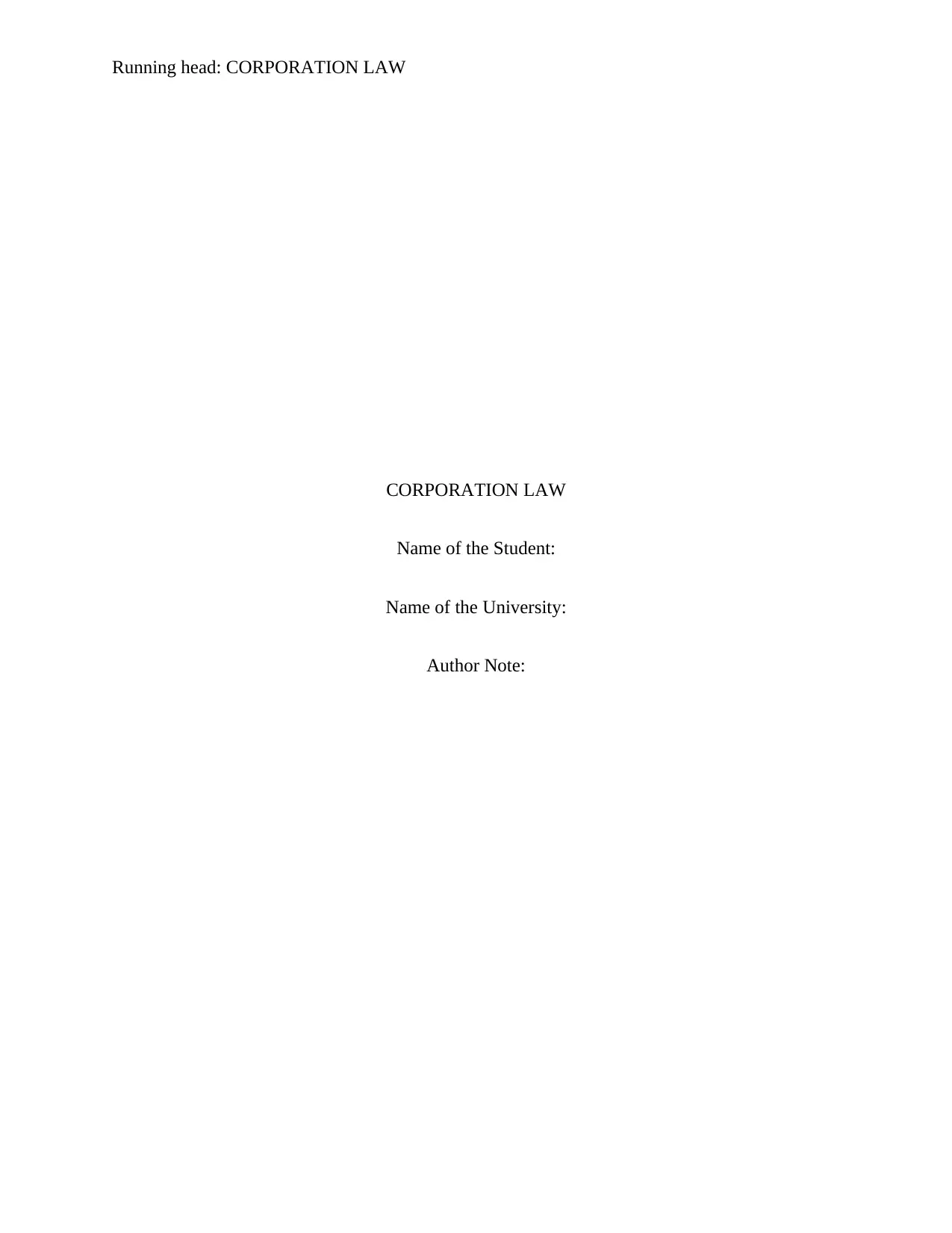
Running head: CORPORATION LAW
CORPORATION LAW
Name of the Student:
Name of the University:
Author Note:
CORPORATION LAW
Name of the Student:
Name of the University:
Author Note:
Secure Best Marks with AI Grader
Need help grading? Try our AI Grader for instant feedback on your assignments.
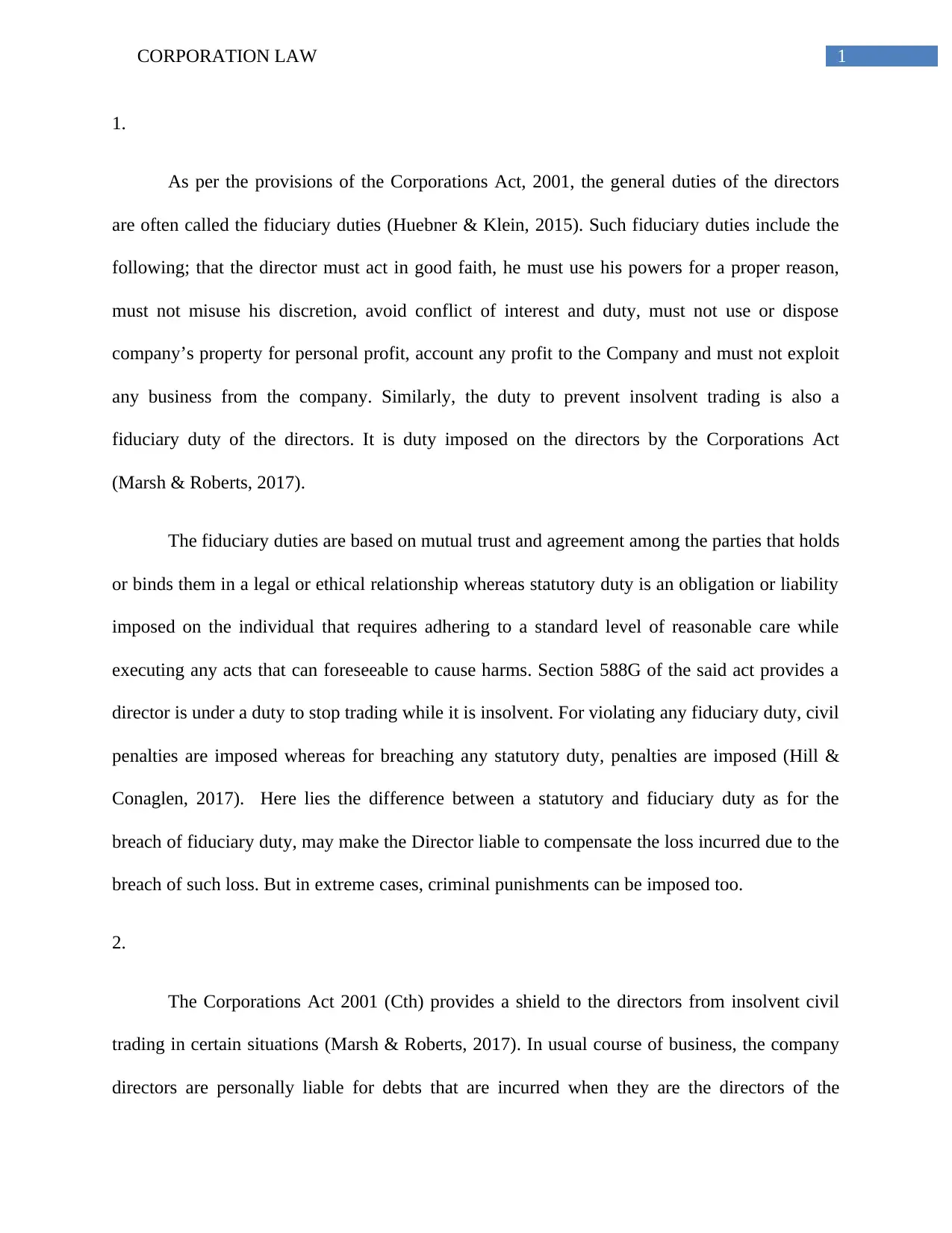
1CORPORATION LAW
1.
As per the provisions of the Corporations Act, 2001, the general duties of the directors
are often called the fiduciary duties (Huebner & Klein, 2015). Such fiduciary duties include the
following; that the director must act in good faith, he must use his powers for a proper reason,
must not misuse his discretion, avoid conflict of interest and duty, must not use or dispose
company’s property for personal profit, account any profit to the Company and must not exploit
any business from the company. Similarly, the duty to prevent insolvent trading is also a
fiduciary duty of the directors. It is duty imposed on the directors by the Corporations Act
(Marsh & Roberts, 2017).
The fiduciary duties are based on mutual trust and agreement among the parties that holds
or binds them in a legal or ethical relationship whereas statutory duty is an obligation or liability
imposed on the individual that requires adhering to a standard level of reasonable care while
executing any acts that can foreseeable to cause harms. Section 588G of the said act provides a
director is under a duty to stop trading while it is insolvent. For violating any fiduciary duty, civil
penalties are imposed whereas for breaching any statutory duty, penalties are imposed (Hill &
Conaglen, 2017). Here lies the difference between a statutory and fiduciary duty as for the
breach of fiduciary duty, may make the Director liable to compensate the loss incurred due to the
breach of such loss. But in extreme cases, criminal punishments can be imposed too.
2.
The Corporations Act 2001 (Cth) provides a shield to the directors from insolvent civil
trading in certain situations (Marsh & Roberts, 2017). In usual course of business, the company
directors are personally liable for debts that are incurred when they are the directors of the
1.
As per the provisions of the Corporations Act, 2001, the general duties of the directors
are often called the fiduciary duties (Huebner & Klein, 2015). Such fiduciary duties include the
following; that the director must act in good faith, he must use his powers for a proper reason,
must not misuse his discretion, avoid conflict of interest and duty, must not use or dispose
company’s property for personal profit, account any profit to the Company and must not exploit
any business from the company. Similarly, the duty to prevent insolvent trading is also a
fiduciary duty of the directors. It is duty imposed on the directors by the Corporations Act
(Marsh & Roberts, 2017).
The fiduciary duties are based on mutual trust and agreement among the parties that holds
or binds them in a legal or ethical relationship whereas statutory duty is an obligation or liability
imposed on the individual that requires adhering to a standard level of reasonable care while
executing any acts that can foreseeable to cause harms. Section 588G of the said act provides a
director is under a duty to stop trading while it is insolvent. For violating any fiduciary duty, civil
penalties are imposed whereas for breaching any statutory duty, penalties are imposed (Hill &
Conaglen, 2017). Here lies the difference between a statutory and fiduciary duty as for the
breach of fiduciary duty, may make the Director liable to compensate the loss incurred due to the
breach of such loss. But in extreme cases, criminal punishments can be imposed too.
2.
The Corporations Act 2001 (Cth) provides a shield to the directors from insolvent civil
trading in certain situations (Marsh & Roberts, 2017). In usual course of business, the company
directors are personally liable for debts that are incurred when they are the directors of the
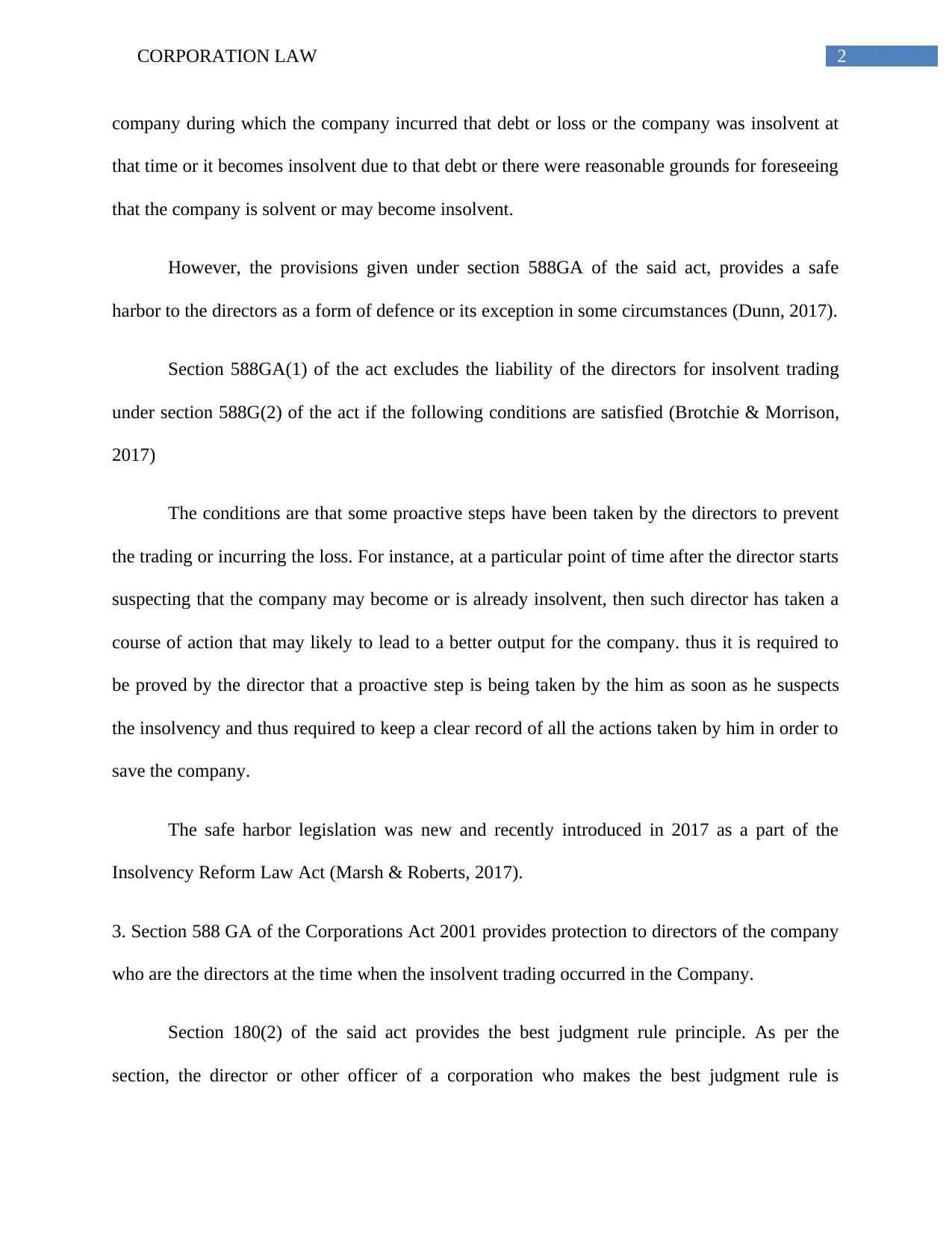
2CORPORATION LAW
company during which the company incurred that debt or loss or the company was insolvent at
that time or it becomes insolvent due to that debt or there were reasonable grounds for foreseeing
that the company is solvent or may become insolvent.
However, the provisions given under section 588GA of the said act, provides a safe
harbor to the directors as a form of defence or its exception in some circumstances (Dunn, 2017).
Section 588GA(1) of the act excludes the liability of the directors for insolvent trading
under section 588G(2) of the act if the following conditions are satisfied (Brotchie & Morrison,
2017)
The conditions are that some proactive steps have been taken by the directors to prevent
the trading or incurring the loss. For instance, at a particular point of time after the director starts
suspecting that the company may become or is already insolvent, then such director has taken a
course of action that may likely to lead to a better output for the company. thus it is required to
be proved by the director that a proactive step is being taken by the him as soon as he suspects
the insolvency and thus required to keep a clear record of all the actions taken by him in order to
save the company.
The safe harbor legislation was new and recently introduced in 2017 as a part of the
Insolvency Reform Law Act (Marsh & Roberts, 2017).
3. Section 588 GA of the Corporations Act 2001 provides protection to directors of the company
who are the directors at the time when the insolvent trading occurred in the Company.
Section 180(2) of the said act provides the best judgment rule principle. As per the
section, the director or other officer of a corporation who makes the best judgment rule is
company during which the company incurred that debt or loss or the company was insolvent at
that time or it becomes insolvent due to that debt or there were reasonable grounds for foreseeing
that the company is solvent or may become insolvent.
However, the provisions given under section 588GA of the said act, provides a safe
harbor to the directors as a form of defence or its exception in some circumstances (Dunn, 2017).
Section 588GA(1) of the act excludes the liability of the directors for insolvent trading
under section 588G(2) of the act if the following conditions are satisfied (Brotchie & Morrison,
2017)
The conditions are that some proactive steps have been taken by the directors to prevent
the trading or incurring the loss. For instance, at a particular point of time after the director starts
suspecting that the company may become or is already insolvent, then such director has taken a
course of action that may likely to lead to a better output for the company. thus it is required to
be proved by the director that a proactive step is being taken by the him as soon as he suspects
the insolvency and thus required to keep a clear record of all the actions taken by him in order to
save the company.
The safe harbor legislation was new and recently introduced in 2017 as a part of the
Insolvency Reform Law Act (Marsh & Roberts, 2017).
3. Section 588 GA of the Corporations Act 2001 provides protection to directors of the company
who are the directors at the time when the insolvent trading occurred in the Company.
Section 180(2) of the said act provides the best judgment rule principle. As per the
section, the director or other officer of a corporation who makes the best judgment rule is
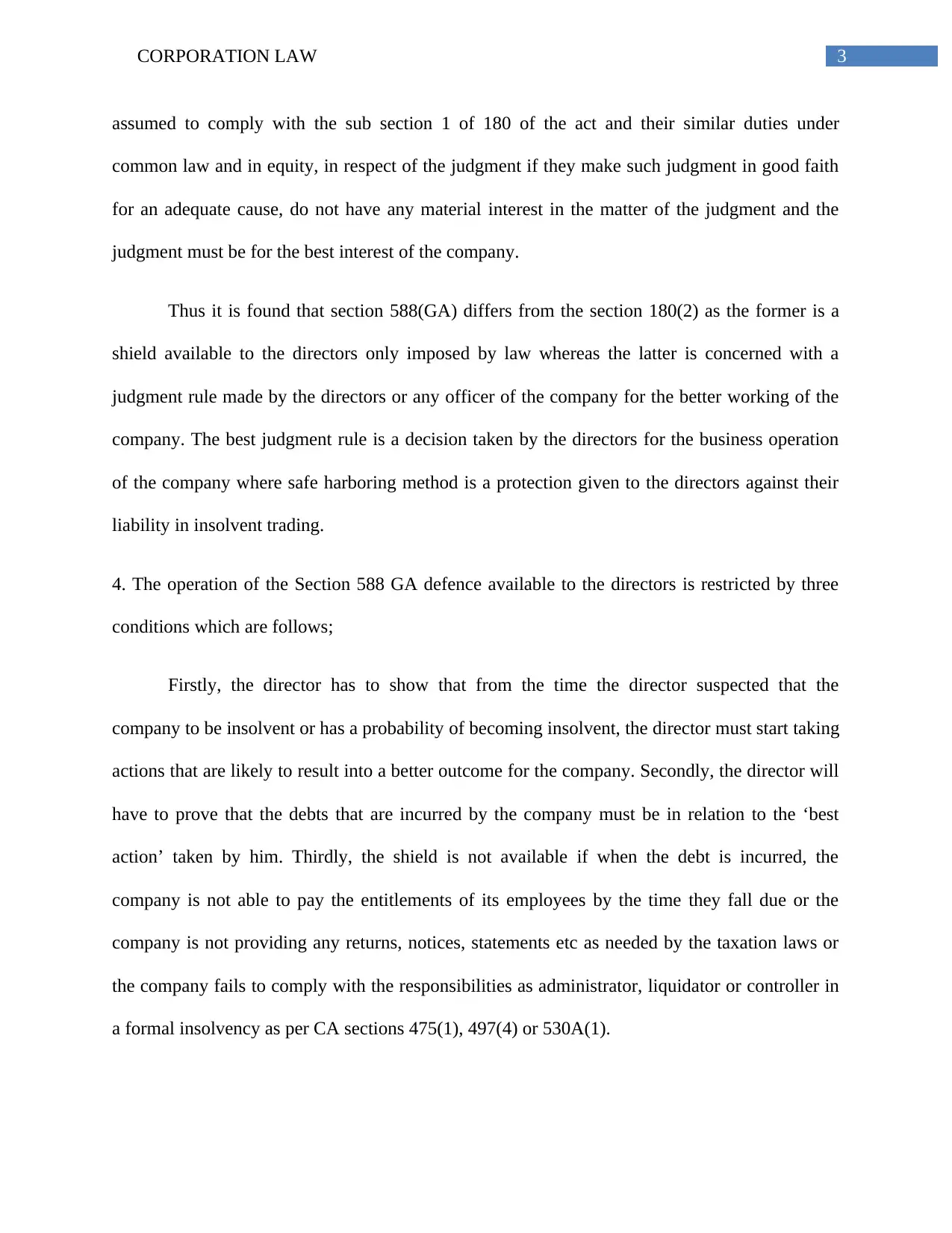
3CORPORATION LAW
assumed to comply with the sub section 1 of 180 of the act and their similar duties under
common law and in equity, in respect of the judgment if they make such judgment in good faith
for an adequate cause, do not have any material interest in the matter of the judgment and the
judgment must be for the best interest of the company.
Thus it is found that section 588(GA) differs from the section 180(2) as the former is a
shield available to the directors only imposed by law whereas the latter is concerned with a
judgment rule made by the directors or any officer of the company for the better working of the
company. The best judgment rule is a decision taken by the directors for the business operation
of the company where safe harboring method is a protection given to the directors against their
liability in insolvent trading.
4. The operation of the Section 588 GA defence available to the directors is restricted by three
conditions which are follows;
Firstly, the director has to show that from the time the director suspected that the
company to be insolvent or has a probability of becoming insolvent, the director must start taking
actions that are likely to result into a better outcome for the company. Secondly, the director will
have to prove that the debts that are incurred by the company must be in relation to the ‘best
action’ taken by him. Thirdly, the shield is not available if when the debt is incurred, the
company is not able to pay the entitlements of its employees by the time they fall due or the
company is not providing any returns, notices, statements etc as needed by the taxation laws or
the company fails to comply with the responsibilities as administrator, liquidator or controller in
a formal insolvency as per CA sections 475(1), 497(4) or 530A(1).
assumed to comply with the sub section 1 of 180 of the act and their similar duties under
common law and in equity, in respect of the judgment if they make such judgment in good faith
for an adequate cause, do not have any material interest in the matter of the judgment and the
judgment must be for the best interest of the company.
Thus it is found that section 588(GA) differs from the section 180(2) as the former is a
shield available to the directors only imposed by law whereas the latter is concerned with a
judgment rule made by the directors or any officer of the company for the better working of the
company. The best judgment rule is a decision taken by the directors for the business operation
of the company where safe harboring method is a protection given to the directors against their
liability in insolvent trading.
4. The operation of the Section 588 GA defence available to the directors is restricted by three
conditions which are follows;
Firstly, the director has to show that from the time the director suspected that the
company to be insolvent or has a probability of becoming insolvent, the director must start taking
actions that are likely to result into a better outcome for the company. Secondly, the director will
have to prove that the debts that are incurred by the company must be in relation to the ‘best
action’ taken by him. Thirdly, the shield is not available if when the debt is incurred, the
company is not able to pay the entitlements of its employees by the time they fall due or the
company is not providing any returns, notices, statements etc as needed by the taxation laws or
the company fails to comply with the responsibilities as administrator, liquidator or controller in
a formal insolvency as per CA sections 475(1), 497(4) or 530A(1).
Secure Best Marks with AI Grader
Need help grading? Try our AI Grader for instant feedback on your assignments.
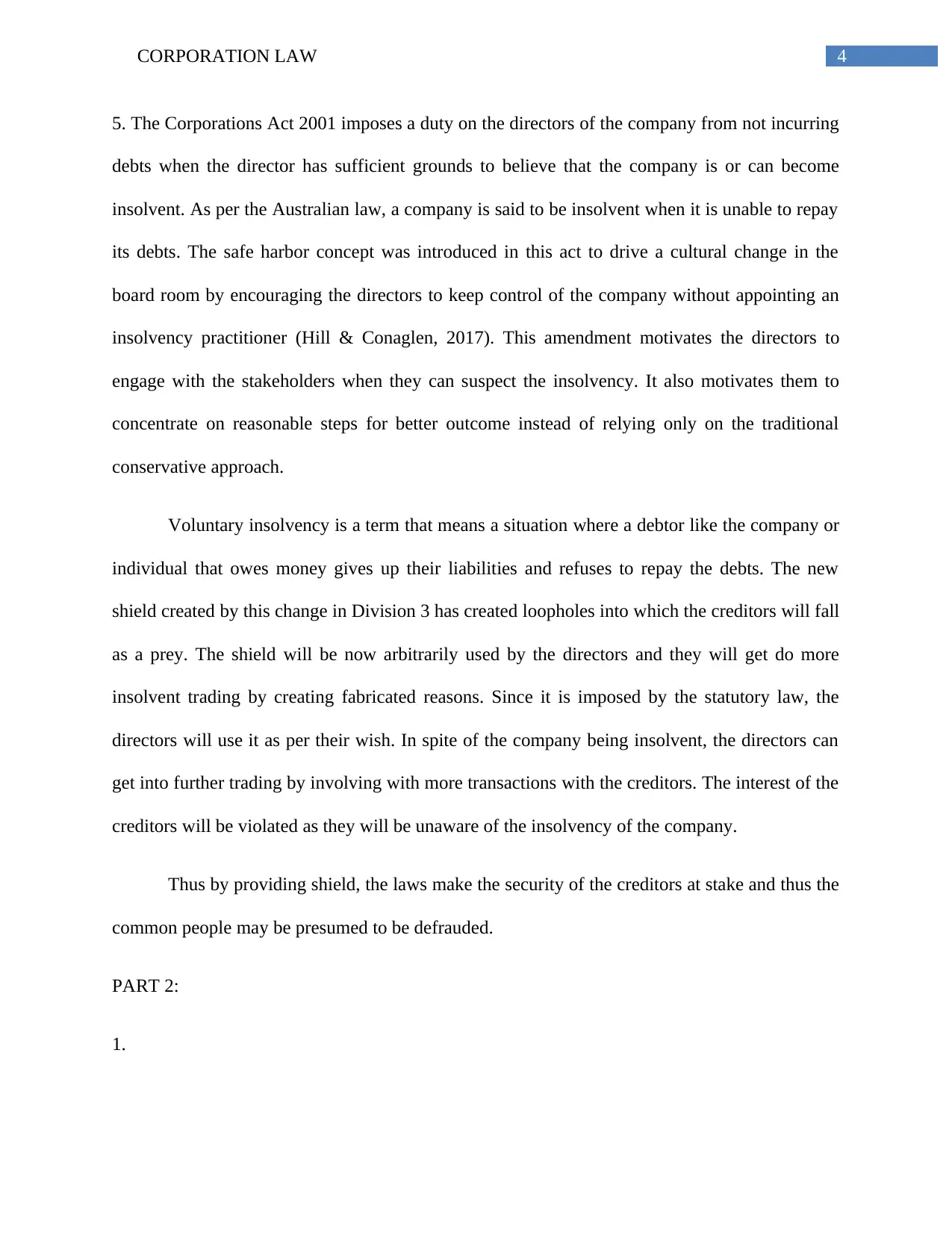
4CORPORATION LAW
5. The Corporations Act 2001 imposes a duty on the directors of the company from not incurring
debts when the director has sufficient grounds to believe that the company is or can become
insolvent. As per the Australian law, a company is said to be insolvent when it is unable to repay
its debts. The safe harbor concept was introduced in this act to drive a cultural change in the
board room by encouraging the directors to keep control of the company without appointing an
insolvency practitioner (Hill & Conaglen, 2017). This amendment motivates the directors to
engage with the stakeholders when they can suspect the insolvency. It also motivates them to
concentrate on reasonable steps for better outcome instead of relying only on the traditional
conservative approach.
Voluntary insolvency is a term that means a situation where a debtor like the company or
individual that owes money gives up their liabilities and refuses to repay the debts. The new
shield created by this change in Division 3 has created loopholes into which the creditors will fall
as a prey. The shield will be now arbitrarily used by the directors and they will get do more
insolvent trading by creating fabricated reasons. Since it is imposed by the statutory law, the
directors will use it as per their wish. In spite of the company being insolvent, the directors can
get into further trading by involving with more transactions with the creditors. The interest of the
creditors will be violated as they will be unaware of the insolvency of the company.
Thus by providing shield, the laws make the security of the creditors at stake and thus the
common people may be presumed to be defrauded.
PART 2:
1.
5. The Corporations Act 2001 imposes a duty on the directors of the company from not incurring
debts when the director has sufficient grounds to believe that the company is or can become
insolvent. As per the Australian law, a company is said to be insolvent when it is unable to repay
its debts. The safe harbor concept was introduced in this act to drive a cultural change in the
board room by encouraging the directors to keep control of the company without appointing an
insolvency practitioner (Hill & Conaglen, 2017). This amendment motivates the directors to
engage with the stakeholders when they can suspect the insolvency. It also motivates them to
concentrate on reasonable steps for better outcome instead of relying only on the traditional
conservative approach.
Voluntary insolvency is a term that means a situation where a debtor like the company or
individual that owes money gives up their liabilities and refuses to repay the debts. The new
shield created by this change in Division 3 has created loopholes into which the creditors will fall
as a prey. The shield will be now arbitrarily used by the directors and they will get do more
insolvent trading by creating fabricated reasons. Since it is imposed by the statutory law, the
directors will use it as per their wish. In spite of the company being insolvent, the directors can
get into further trading by involving with more transactions with the creditors. The interest of the
creditors will be violated as they will be unaware of the insolvency of the company.
Thus by providing shield, the laws make the security of the creditors at stake and thus the
common people may be presumed to be defrauded.
PART 2:
1.
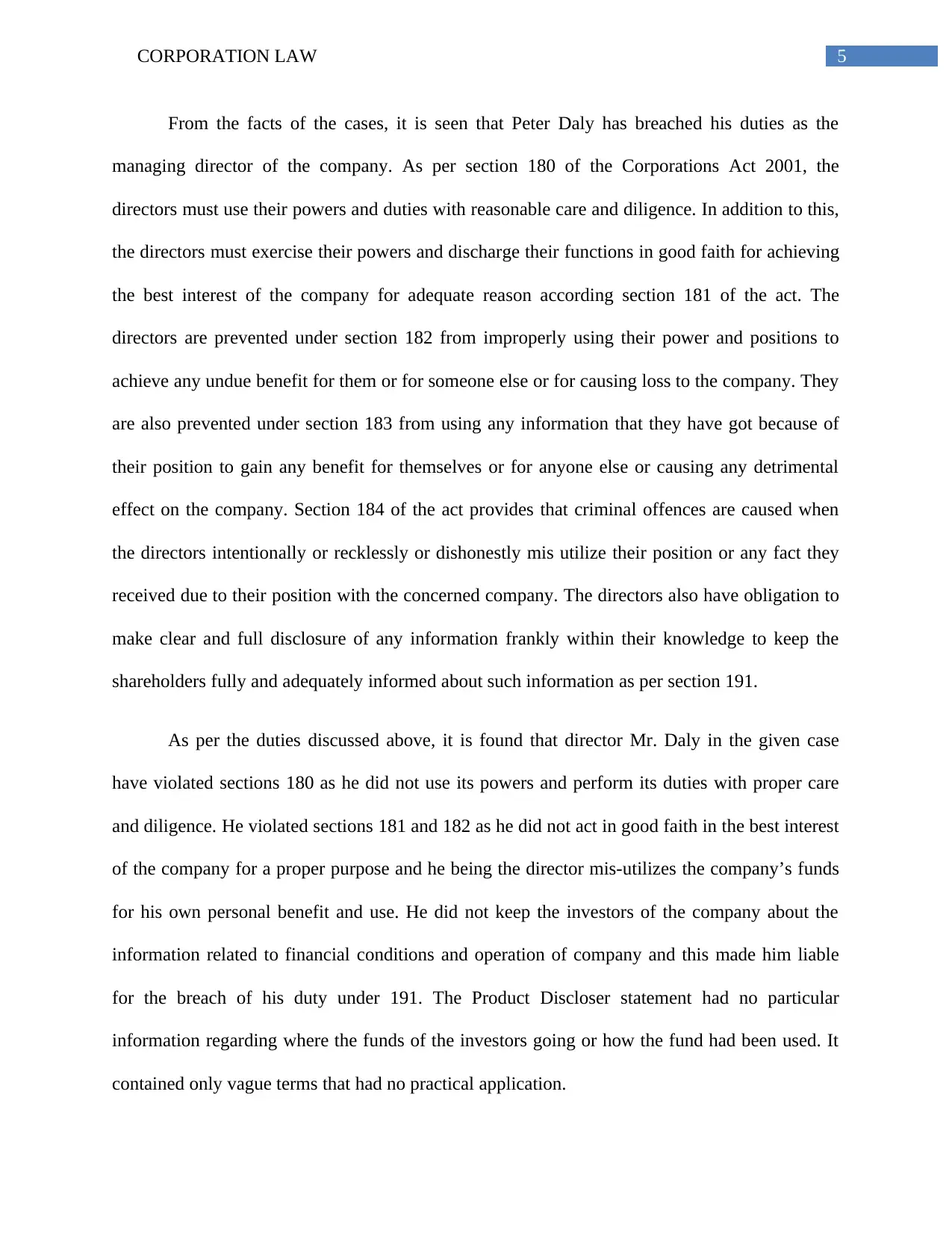
5CORPORATION LAW
From the facts of the cases, it is seen that Peter Daly has breached his duties as the
managing director of the company. As per section 180 of the Corporations Act 2001, the
directors must use their powers and duties with reasonable care and diligence. In addition to this,
the directors must exercise their powers and discharge their functions in good faith for achieving
the best interest of the company for adequate reason according section 181 of the act. The
directors are prevented under section 182 from improperly using their power and positions to
achieve any undue benefit for them or for someone else or for causing loss to the company. They
are also prevented under section 183 from using any information that they have got because of
their position to gain any benefit for themselves or for anyone else or causing any detrimental
effect on the company. Section 184 of the act provides that criminal offences are caused when
the directors intentionally or recklessly or dishonestly mis utilize their position or any fact they
received due to their position with the concerned company. The directors also have obligation to
make clear and full disclosure of any information frankly within their knowledge to keep the
shareholders fully and adequately informed about such information as per section 191.
As per the duties discussed above, it is found that director Mr. Daly in the given case
have violated sections 180 as he did not use its powers and perform its duties with proper care
and diligence. He violated sections 181 and 182 as he did not act in good faith in the best interest
of the company for a proper purpose and he being the director mis-utilizes the company’s funds
for his own personal benefit and use. He did not keep the investors of the company about the
information related to financial conditions and operation of company and this made him liable
for the breach of his duty under 191. The Product Discloser statement had no particular
information regarding where the funds of the investors going or how the fund had been used. It
contained only vague terms that had no practical application.
From the facts of the cases, it is seen that Peter Daly has breached his duties as the
managing director of the company. As per section 180 of the Corporations Act 2001, the
directors must use their powers and duties with reasonable care and diligence. In addition to this,
the directors must exercise their powers and discharge their functions in good faith for achieving
the best interest of the company for adequate reason according section 181 of the act. The
directors are prevented under section 182 from improperly using their power and positions to
achieve any undue benefit for them or for someone else or for causing loss to the company. They
are also prevented under section 183 from using any information that they have got because of
their position to gain any benefit for themselves or for anyone else or causing any detrimental
effect on the company. Section 184 of the act provides that criminal offences are caused when
the directors intentionally or recklessly or dishonestly mis utilize their position or any fact they
received due to their position with the concerned company. The directors also have obligation to
make clear and full disclosure of any information frankly within their knowledge to keep the
shareholders fully and adequately informed about such information as per section 191.
As per the duties discussed above, it is found that director Mr. Daly in the given case
have violated sections 180 as he did not use its powers and perform its duties with proper care
and diligence. He violated sections 181 and 182 as he did not act in good faith in the best interest
of the company for a proper purpose and he being the director mis-utilizes the company’s funds
for his own personal benefit and use. He did not keep the investors of the company about the
information related to financial conditions and operation of company and this made him liable
for the breach of his duty under 191. The Product Discloser statement had no particular
information regarding where the funds of the investors going or how the fund had been used. It
contained only vague terms that had no practical application.
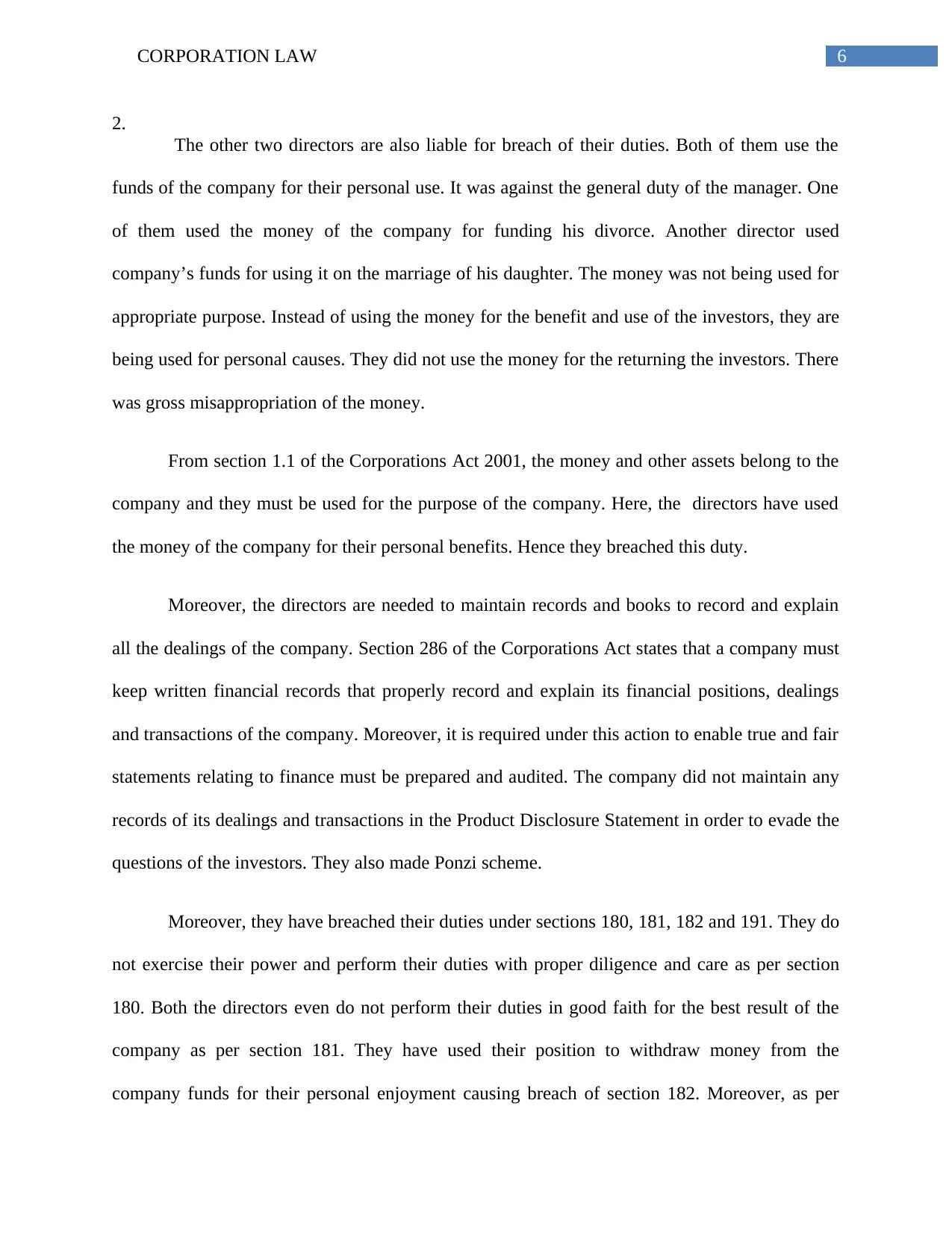
6CORPORATION LAW
2.
The other two directors are also liable for breach of their duties. Both of them use the
funds of the company for their personal use. It was against the general duty of the manager. One
of them used the money of the company for funding his divorce. Another director used
company’s funds for using it on the marriage of his daughter. The money was not being used for
appropriate purpose. Instead of using the money for the benefit and use of the investors, they are
being used for personal causes. They did not use the money for the returning the investors. There
was gross misappropriation of the money.
From section 1.1 of the Corporations Act 2001, the money and other assets belong to the
company and they must be used for the purpose of the company. Here, the directors have used
the money of the company for their personal benefits. Hence they breached this duty.
Moreover, the directors are needed to maintain records and books to record and explain
all the dealings of the company. Section 286 of the Corporations Act states that a company must
keep written financial records that properly record and explain its financial positions, dealings
and transactions of the company. Moreover, it is required under this action to enable true and fair
statements relating to finance must be prepared and audited. The company did not maintain any
records of its dealings and transactions in the Product Disclosure Statement in order to evade the
questions of the investors. They also made Ponzi scheme.
Moreover, they have breached their duties under sections 180, 181, 182 and 191. They do
not exercise their power and perform their duties with proper diligence and care as per section
180. Both the directors even do not perform their duties in good faith for the best result of the
company as per section 181. They have used their position to withdraw money from the
company funds for their personal enjoyment causing breach of section 182. Moreover, as per
2.
The other two directors are also liable for breach of their duties. Both of them use the
funds of the company for their personal use. It was against the general duty of the manager. One
of them used the money of the company for funding his divorce. Another director used
company’s funds for using it on the marriage of his daughter. The money was not being used for
appropriate purpose. Instead of using the money for the benefit and use of the investors, they are
being used for personal causes. They did not use the money for the returning the investors. There
was gross misappropriation of the money.
From section 1.1 of the Corporations Act 2001, the money and other assets belong to the
company and they must be used for the purpose of the company. Here, the directors have used
the money of the company for their personal benefits. Hence they breached this duty.
Moreover, the directors are needed to maintain records and books to record and explain
all the dealings of the company. Section 286 of the Corporations Act states that a company must
keep written financial records that properly record and explain its financial positions, dealings
and transactions of the company. Moreover, it is required under this action to enable true and fair
statements relating to finance must be prepared and audited. The company did not maintain any
records of its dealings and transactions in the Product Disclosure Statement in order to evade the
questions of the investors. They also made Ponzi scheme.
Moreover, they have breached their duties under sections 180, 181, 182 and 191. They do
not exercise their power and perform their duties with proper diligence and care as per section
180. Both the directors even do not perform their duties in good faith for the best result of the
company as per section 181. They have used their position to withdraw money from the
company funds for their personal enjoyment causing breach of section 182. Moreover, as per
Paraphrase This Document
Need a fresh take? Get an instant paraphrase of this document with our AI Paraphraser
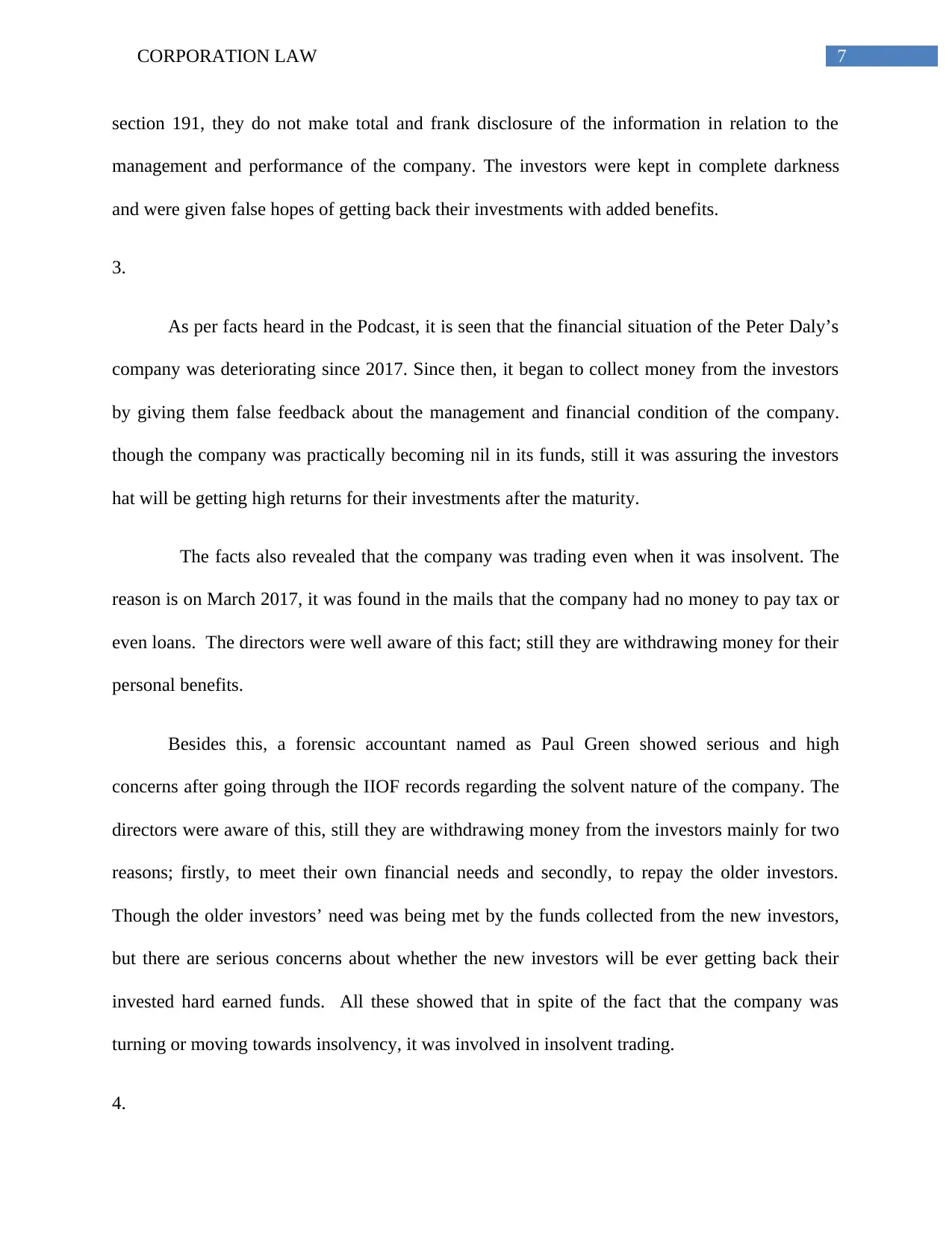
7CORPORATION LAW
section 191, they do not make total and frank disclosure of the information in relation to the
management and performance of the company. The investors were kept in complete darkness
and were given false hopes of getting back their investments with added benefits.
3.
As per facts heard in the Podcast, it is seen that the financial situation of the Peter Daly’s
company was deteriorating since 2017. Since then, it began to collect money from the investors
by giving them false feedback about the management and financial condition of the company.
though the company was practically becoming nil in its funds, still it was assuring the investors
hat will be getting high returns for their investments after the maturity.
The facts also revealed that the company was trading even when it was insolvent. The
reason is on March 2017, it was found in the mails that the company had no money to pay tax or
even loans. The directors were well aware of this fact; still they are withdrawing money for their
personal benefits.
Besides this, a forensic accountant named as Paul Green showed serious and high
concerns after going through the IIOF records regarding the solvent nature of the company. The
directors were aware of this, still they are withdrawing money from the investors mainly for two
reasons; firstly, to meet their own financial needs and secondly, to repay the older investors.
Though the older investors’ need was being met by the funds collected from the new investors,
but there are serious concerns about whether the new investors will be ever getting back their
invested hard earned funds. All these showed that in spite of the fact that the company was
turning or moving towards insolvency, it was involved in insolvent trading.
4.
section 191, they do not make total and frank disclosure of the information in relation to the
management and performance of the company. The investors were kept in complete darkness
and were given false hopes of getting back their investments with added benefits.
3.
As per facts heard in the Podcast, it is seen that the financial situation of the Peter Daly’s
company was deteriorating since 2017. Since then, it began to collect money from the investors
by giving them false feedback about the management and financial condition of the company.
though the company was practically becoming nil in its funds, still it was assuring the investors
hat will be getting high returns for their investments after the maturity.
The facts also revealed that the company was trading even when it was insolvent. The
reason is on March 2017, it was found in the mails that the company had no money to pay tax or
even loans. The directors were well aware of this fact; still they are withdrawing money for their
personal benefits.
Besides this, a forensic accountant named as Paul Green showed serious and high
concerns after going through the IIOF records regarding the solvent nature of the company. The
directors were aware of this, still they are withdrawing money from the investors mainly for two
reasons; firstly, to meet their own financial needs and secondly, to repay the older investors.
Though the older investors’ need was being met by the funds collected from the new investors,
but there are serious concerns about whether the new investors will be ever getting back their
invested hard earned funds. All these showed that in spite of the fact that the company was
turning or moving towards insolvency, it was involved in insolvent trading.
4.
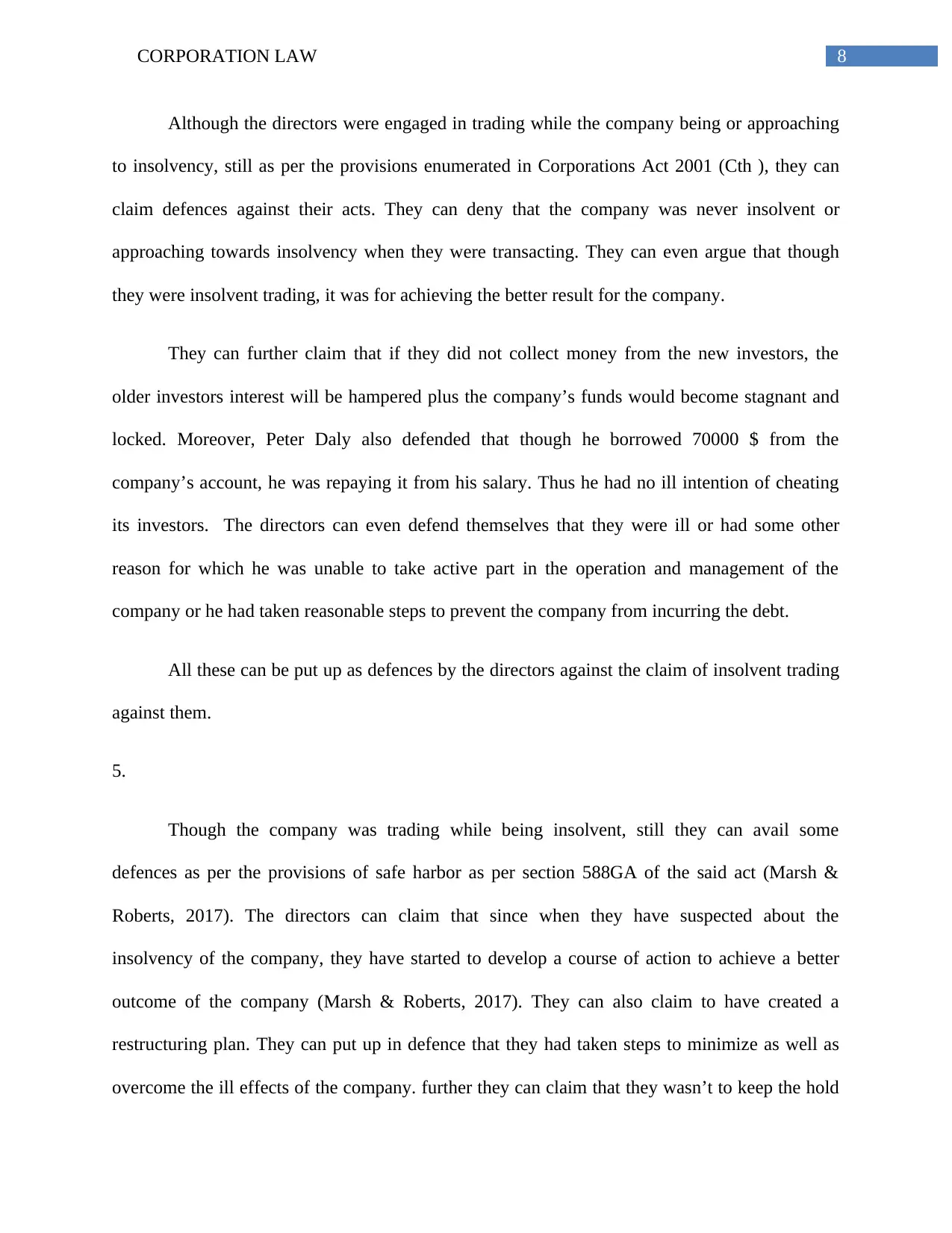
8CORPORATION LAW
Although the directors were engaged in trading while the company being or approaching
to insolvency, still as per the provisions enumerated in Corporations Act 2001 (Cth ), they can
claim defences against their acts. They can deny that the company was never insolvent or
approaching towards insolvency when they were transacting. They can even argue that though
they were insolvent trading, it was for achieving the better result for the company.
They can further claim that if they did not collect money from the new investors, the
older investors interest will be hampered plus the company’s funds would become stagnant and
locked. Moreover, Peter Daly also defended that though he borrowed 70000 $ from the
company’s account, he was repaying it from his salary. Thus he had no ill intention of cheating
its investors. The directors can even defend themselves that they were ill or had some other
reason for which he was unable to take active part in the operation and management of the
company or he had taken reasonable steps to prevent the company from incurring the debt.
All these can be put up as defences by the directors against the claim of insolvent trading
against them.
5.
Though the company was trading while being insolvent, still they can avail some
defences as per the provisions of safe harbor as per section 588GA of the said act (Marsh &
Roberts, 2017). The directors can claim that since when they have suspected about the
insolvency of the company, they have started to develop a course of action to achieve a better
outcome of the company (Marsh & Roberts, 2017). They can also claim to have created a
restructuring plan. They can put up in defence that they had taken steps to minimize as well as
overcome the ill effects of the company. further they can claim that they wasn’t to keep the hold
Although the directors were engaged in trading while the company being or approaching
to insolvency, still as per the provisions enumerated in Corporations Act 2001 (Cth ), they can
claim defences against their acts. They can deny that the company was never insolvent or
approaching towards insolvency when they were transacting. They can even argue that though
they were insolvent trading, it was for achieving the better result for the company.
They can further claim that if they did not collect money from the new investors, the
older investors interest will be hampered plus the company’s funds would become stagnant and
locked. Moreover, Peter Daly also defended that though he borrowed 70000 $ from the
company’s account, he was repaying it from his salary. Thus he had no ill intention of cheating
its investors. The directors can even defend themselves that they were ill or had some other
reason for which he was unable to take active part in the operation and management of the
company or he had taken reasonable steps to prevent the company from incurring the debt.
All these can be put up as defences by the directors against the claim of insolvent trading
against them.
5.
Though the company was trading while being insolvent, still they can avail some
defences as per the provisions of safe harbor as per section 588GA of the said act (Marsh &
Roberts, 2017). The directors can claim that since when they have suspected about the
insolvency of the company, they have started to develop a course of action to achieve a better
outcome of the company (Marsh & Roberts, 2017). They can also claim to have created a
restructuring plan. They can put up in defence that they had taken steps to minimize as well as
overcome the ill effects of the company. further they can claim that they wasn’t to keep the hold
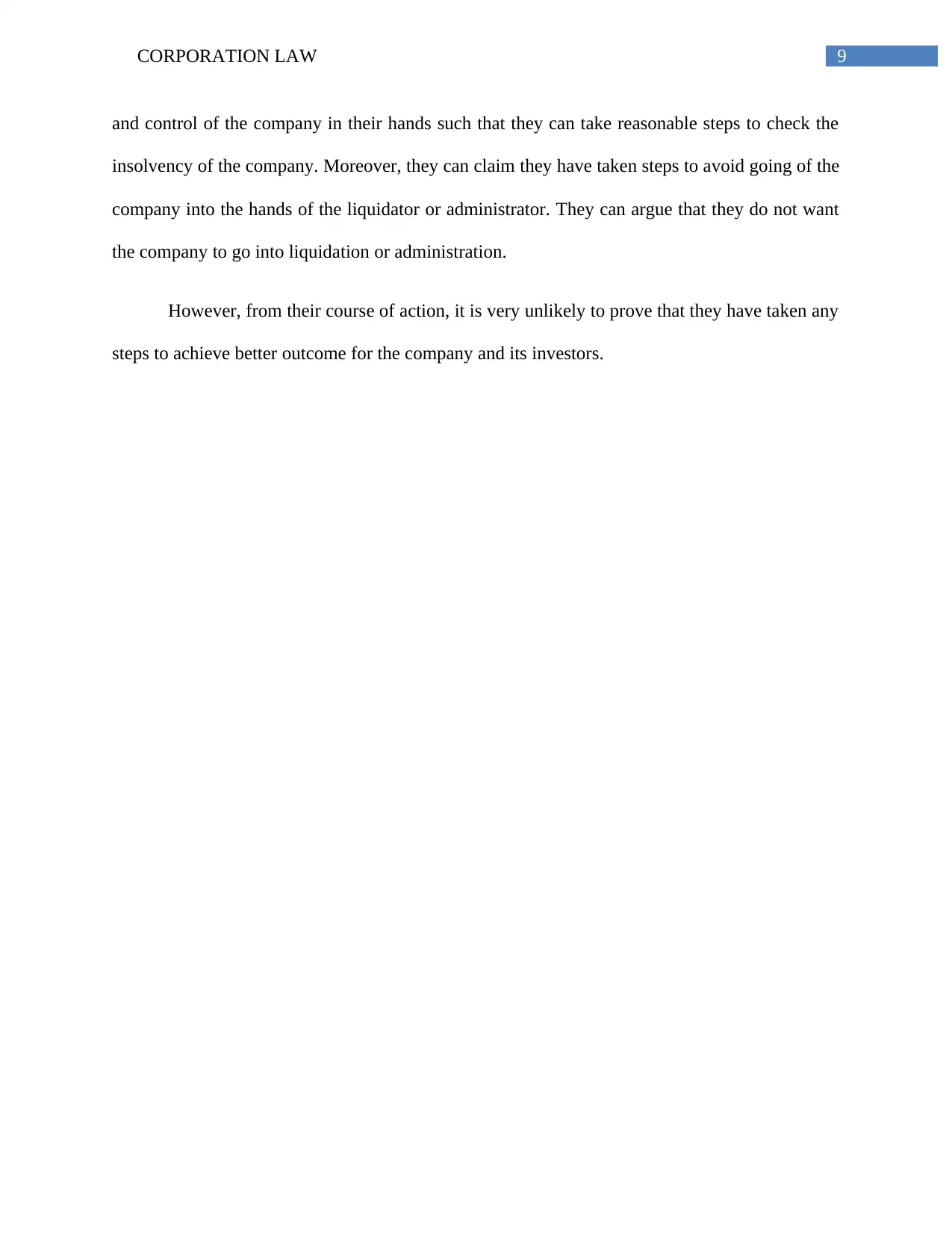
9CORPORATION LAW
and control of the company in their hands such that they can take reasonable steps to check the
insolvency of the company. Moreover, they can claim they have taken steps to avoid going of the
company into the hands of the liquidator or administrator. They can argue that they do not want
the company to go into liquidation or administration.
However, from their course of action, it is very unlikely to prove that they have taken any
steps to achieve better outcome for the company and its investors.
and control of the company in their hands such that they can take reasonable steps to check the
insolvency of the company. Moreover, they can claim they have taken steps to avoid going of the
company into the hands of the liquidator or administrator. They can argue that they do not want
the company to go into liquidation or administration.
However, from their course of action, it is very unlikely to prove that they have taken any
steps to achieve better outcome for the company and its investors.
Secure Best Marks with AI Grader
Need help grading? Try our AI Grader for instant feedback on your assignments.
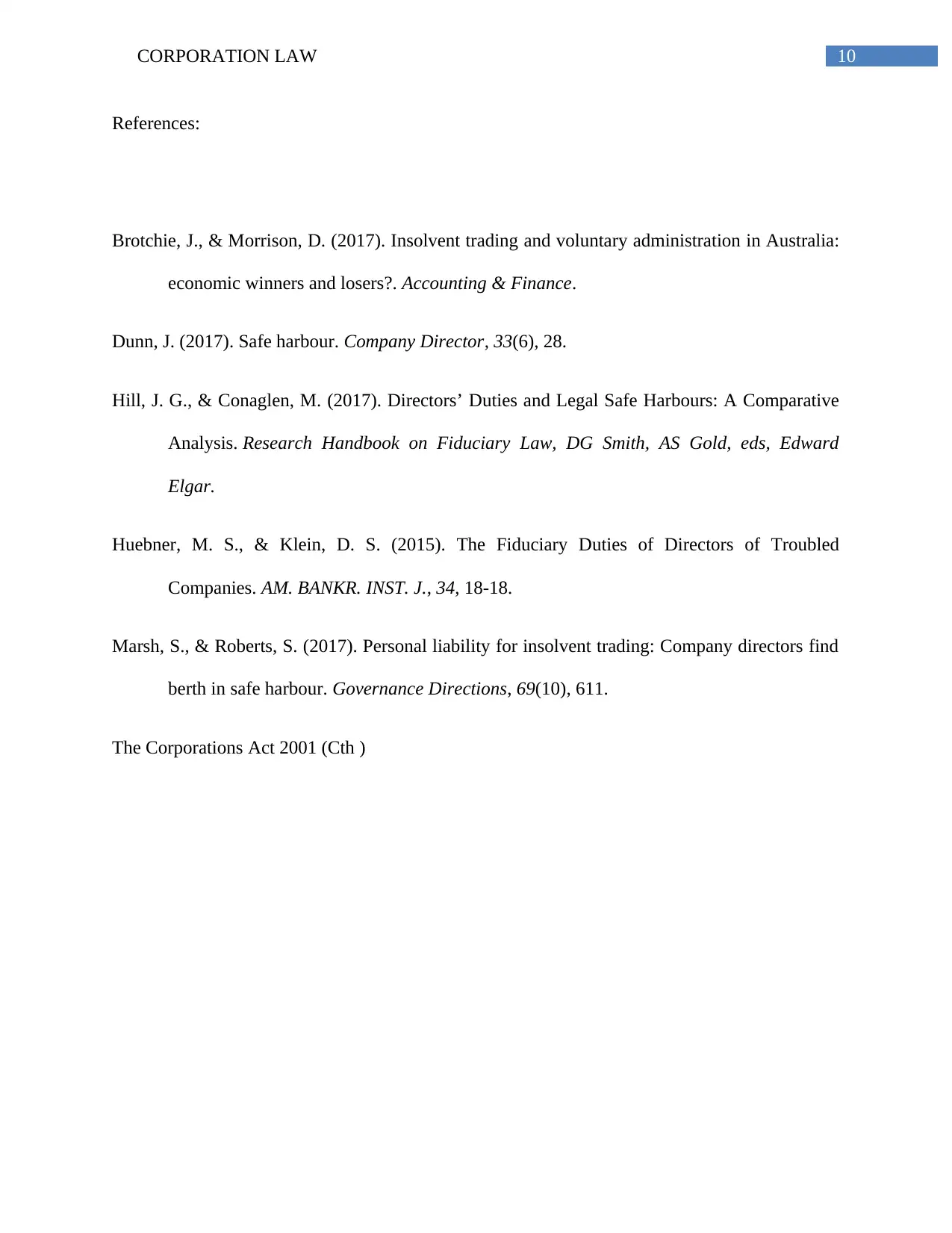
10CORPORATION LAW
References:
Brotchie, J., & Morrison, D. (2017). Insolvent trading and voluntary administration in Australia:
economic winners and losers?. Accounting & Finance.
Dunn, J. (2017). Safe harbour. Company Director, 33(6), 28.
Hill, J. G., & Conaglen, M. (2017). Directors’ Duties and Legal Safe Harbours: A Comparative
Analysis. Research Handbook on Fiduciary Law, DG Smith, AS Gold, eds, Edward
Elgar.
Huebner, M. S., & Klein, D. S. (2015). The Fiduciary Duties of Directors of Troubled
Companies. AM. BANKR. INST. J., 34, 18-18.
Marsh, S., & Roberts, S. (2017). Personal liability for insolvent trading: Company directors find
berth in safe harbour. Governance Directions, 69(10), 611.
The Corporations Act 2001 (Cth )
References:
Brotchie, J., & Morrison, D. (2017). Insolvent trading and voluntary administration in Australia:
economic winners and losers?. Accounting & Finance.
Dunn, J. (2017). Safe harbour. Company Director, 33(6), 28.
Hill, J. G., & Conaglen, M. (2017). Directors’ Duties and Legal Safe Harbours: A Comparative
Analysis. Research Handbook on Fiduciary Law, DG Smith, AS Gold, eds, Edward
Elgar.
Huebner, M. S., & Klein, D. S. (2015). The Fiduciary Duties of Directors of Troubled
Companies. AM. BANKR. INST. J., 34, 18-18.
Marsh, S., & Roberts, S. (2017). Personal liability for insolvent trading: Company directors find
berth in safe harbour. Governance Directions, 69(10), 611.
The Corporations Act 2001 (Cth )
1 out of 11
Related Documents
Your All-in-One AI-Powered Toolkit for Academic Success.
+13062052269
info@desklib.com
Available 24*7 on WhatsApp / Email
![[object Object]](/_next/static/media/star-bottom.7253800d.svg)
Unlock your academic potential
© 2024 | Zucol Services PVT LTD | All rights reserved.





